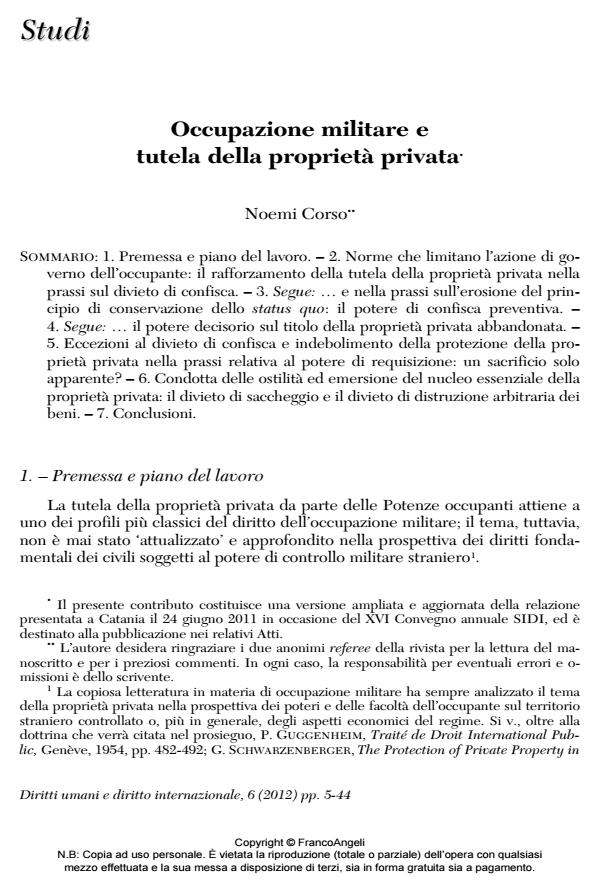Occupazione militare e tutela della proprietà privata
Titolo Rivista DIRITTI UMANI E DIRITTO INTERNAZIONALE
Autori/Curatori Noemi Corso
Anno di pubblicazione 2012 Fascicolo 2012/1 Lingua Italiano
Numero pagine 40 P. 5-44 Dimensione file 369 KB
DOI 10.3280/DUDI2012-001001
Il DOI è il codice a barre della proprietà intellettuale: per saperne di più
clicca qui
Qui sotto puoi vedere in anteprima la prima pagina di questo articolo.
Se questo articolo ti interessa, lo puoi acquistare (e scaricare in formato pdf) seguendo le facili indicazioni per acquistare il download credit. Acquista Download Credits per scaricare questo Articolo in formato PDF

FrancoAngeli è membro della Publishers International Linking Association, Inc (PILA)associazione indipendente e non profit per facilitare (attraverso i servizi tecnologici implementati da CrossRef.org) l’accesso degli studiosi ai contenuti digitali nelle pubblicazioni professionali e scientifiche
Moving from the complementary relationship between International Humanitarian Law and International Human Rights Law, this article analyses the issue of private property in occupied territory from the civilians perspective. In the attempt to verify if contemporaneous practice has modified customary international law obligations of Occupying Powers, the Author highlights the complex and heterogeneous evolution of the protection of the right to private property. On the one hand, practice confirms the strengthening of its safeguard by the extensive interpretation of the absolute prohibition on confiscation, forbidding an occupying power to take "permanent" measures of dispossession and de facto transfer of title. The same result is achieved by the enlargement of the material scope of application of the crime of pillage, and by the narrow interpretation of the derogation clause of the "absolute necessity of military operations", contained in the rule prohibiting the destruction of private property. Moreover, practice’s development proves the existence of a privileged class of assets (such as foodstuffs, houses, or medical supplies), whose essential nature to the well-being of the civilian population makes them object of a stronger guarantee. On the other hand, recent trends show a weakening in the protection of the right to private property, above all within the context of prolonged occupation as well as trans- formative one. The occupant’s widest powers of requisition of private property in these particular cases interfere in a deeper manner with the enjoyment of the right in hand, partly justified by the more and more flexible interpretation given to the general conservationist principle of military occupation law. Actually, this weakening is only apparent. From a broader point of view, the less protection of the right to private property is counterbalanced by the use of the proportionality test, to assess if occupying power action respects the other human rights of the civilian population.;
Noemi Corso, Occupazione militare e tutela della proprietà privata in "DIRITTI UMANI E DIRITTO INTERNAZIONALE" 1/2012, pp 5-44, DOI: 10.3280/DUDI2012-001001